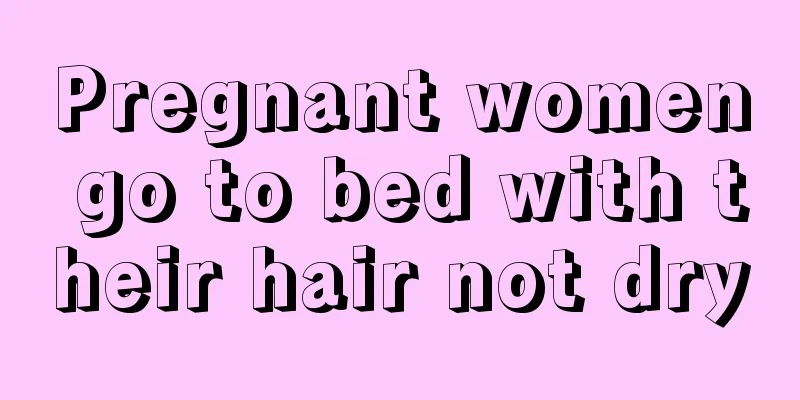Pregnant women go to bed with their hair not dry

|
Many people are accustomed to washing their hair at night, but you must make sure to blow dry your hair before going to bed. You cannot go to bed with wet hair. You should pay special attention to this issue. If pregnant women go to bed with wet hair, it will cause physical harm, such as hair breakage, facial paralysis, and dizziness. Especially in traditional Chinese medicine, the night is colder and the body's resistance is weaker, so sleeping with wet hair can make the body more susceptible to colds. A woman's facial paralysis after sleeping with wet hair It is reported that a 32-year-old woman often washes her hair at night and goes to bed before her hair is completely dry due to her busy work. One day, after washing my hair as usual, I went to bed without blow-drying it. Unexpectedly, the next morning when she was washing up, she found that the left side of her face was suddenly unable to move. When she looked in the mirror, she found that her mouth had become crooked and she couldn't even hold water in her mouth when brushing her teeth. After consultation with the doctor, it was found that the cause of the woman's facial paralysis was most likely that she went to bed without drying her hair. Doctors said that this type of case is very common in clinical practice and is more common among working women. They are busy with work and their hair is not easy to dry after washing at night, so they just go to bed with wet hair to save time. Be careful of these dangers when sleeping with wet hair Hair brittleness Wet hair is fragile. Wet hair can easily get tangled and broken when you toss and turn in your sleep, and it can be difficult to comb it straight in the morning. Colds and flu Traditional Chinese medicine believes that human yang energy is weakest at night and the ability to resist wind and cold is low. After washing your hair, a large amount of water will evaporate from your head, taking away heat from your body. If you fall asleep at this time, you will easily catch a cold. Induced facial paralysis Facial paralysis, scientifically known as facial nerve paralysis, generally has symptoms of facial and eye deviation. Patients are often unable to complete even the most basic movements such as raising eyebrows, closing eyes, and puffing lips. When sleeping at night, the facial nerve is at its most relaxed and has the lowest resistance. If it is stimulated by the cold of wet hair, it can easily affect the facial nerve behind the ear, causing local spasm and inducing facial paralysis. Pillows breed bacteria Sleeping with wet hair will make the pillow damp, which becomes a source of bacteria growth. When your face comes into close contact with a pillow covered with bacteria and you sleep with it, it is not surprising that you catch a cold. Dizziness and nausea Western medicine believes that sleeping with wet hair can easily cause dizziness and nausea. People who have the habit of washing their hair before going to bed at night are prone to illness if they do not dry their hair carefully, causing a large amount of water to remain on the surface of the scalp and go to bed directly. The next morning, you may experience unexplained headaches or dizziness, and in severe cases, nausea. Produces gray hair Night is the time when hormone secretion in the body is most active, and melanocyte-stimulating hormone can make the body secrete more melanin. When you sleep with wet hair, because the hair is still wet and in a cold state, it is difficult for melanin to be secreted. Over time, the hair will turn white. Dandruff and scalp lesions Sleeping with wet hair will cause a large amount of water to be retained on the surface of the scalp. The damp and airtight environment is prone to the growth of microorganisms, causing dandruff and scalp lesions. Many people have the habit of sleeping with wet hair, and the part of the scalp that is next to the pillow is prone to skin problems. Hair loss, poor hair quality If you fall asleep right after washing your hair, the relatively humid and cold environment will affect the local blood circulation of the hair follicles. The hair papilla will not get enough blood supply, causing hair loss, dry and split hair, etc. |
<<: Why do I hiccup during pregnancy?
>>: Can I pull my hair while breastfeeding?
Recommend
What are the secrets for women to stay young?
Many female friends often say that they are old a...
Women sweating coldly when sleeping at night
The extreme temperature environment in winter has...
What to do if you have pain down there
For women, cleaning of private parts is very impo...
Is it good to wear headphones often? What are the dangers of wearing headphones for a long time?
There are many disadvantages of wearing headphone...
How long should the belly band be removed after cesarean section and what should be paid attention to
Nowadays, many pregnant mothers need to undergo s...
How to create a short oily hairstyle for girls
Modern society is developing rapidly and has been...
What are reusable masks? How to deal with reusable masks?
We all know that masks are a common type of prote...
Can I have sex on the first day of my period?
Female friends who have some basic physiological ...
What do pregnant women need to prepare for childbirth?
Now that people's living conditions are good,...
Pain on left pelvic brim
Some women often feel pain on the left side of th...
Tight stomach in late pregnancy
The tightening of the abdomen in the late pregnan...
What sleeping position is easy to get pregnant?
Sleep can improve your physical condition, which ...
Causes of delayed follicular development
The growth rate and level of the egg are normal. ...









